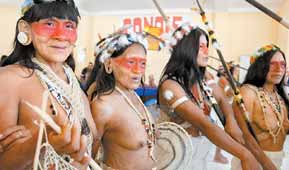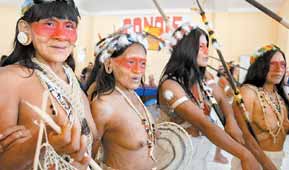|
El Comercio
July 17, 2005
A Historical Contradiction Is Revived With the Huao Presence
Quito Edition
The conservation of Yasuni National Park has entered the debate once again. But this time the conflict is accompanied by the breakage of the relations between the Huaorani nation and the Brazilian oil company, Petrobras.
To this is added the evident struggle between the Indigenous people of the Amazonian ethnicity.
At stake are 680,000 hectares, that comprise this protected area and that are declared a biosphere reserve.
In its interior are 621 species of birds, 173 types of mammals, amphibians, reptiles, diversity of fish, and more than 1,200 species of plants, constituting one of the most important reserves of Ecuador and South America.
With spears and head dresses of feathers, the indigenous people demanded that Petrobras suspend their operations in Block 31, which

|
The Huaorani women prepared for the march last Tuesday in the CONAIE installations. They wanted to speak with the President. EL COMERCIO |
This pressure, that is evidenced in the streets of Quito, with international impact, without doubt, the conflict reveals the positions and interests of the Amazonian interests.
Moi Enomenga, member of this ethnic group, met with members of Parliament of the United States, and was emphatic: he asked for an immediate moratorium of all of the new oil projects in the Huaorani territory. For him, this will permit the communities to organize. The negotiations of Enomenga, since his trip to the United States, were not pleasing to the leaders in principle. To this fact is added the opposition of the Counsel of the Elders of the Huaorani and the incompletion of agreements with Petrobras.
To these disagreements are added the alleged accusation against the ex-President of the Huaorani Nation, Armando Boya, who had signed an agreement with Petrobras, at the end of his term, without consulting with the inhabitants of the provinces of Pastaza, Napo and Orellana.
This agreement for Nicolás Yumbo, president of the Federation of the Common Union of Natives of the Ecuadorian Amazon (FCUNAE), would not be easy to dissolve. Just as he says, the Huaos have relations with Petrobras though the company Kantare. Nevertheless, it does not sustain its denunciation with documents.
Petrobras also has arguments in its defense. The oil company indicated that they have not failed the agreements signed with the Huaorani nation. According to this, since 1997, signed agreements with the Quichua community which is the only Huaorani ethnic group that is encountered in Block 31.
This conflict, in which are economic and political interests at stake, the only that puts in jeopardy the future of one of the major conservation sites of the world.
Sunday, July 17 th, 2005
_______________
EN ESPANOL
Una contradicción histórica revive con la presencia huao 
Redacción Quito
La conservación del Parque Nacional Yasuní nuevamente entra en debate. Pero esta vez el conflicto viene acompañado con el rompimiento de las relaciones entre la nacionalidad huaorani y la petrolera brasileña Petrobras.
A este hecho se suma la evidente pugna entre los indígenas de la etnia amazónica.
En juego están las 680 000 hectáreas, que componen es ta área protegida y que fue declarada reserva de la biósfera.
En su interior alberga 621 especies de aves, 173 tipos de mamíferos, anfibios, reptiles, diversidad de peces y más de 1 200 especies de plantas, constituyéndose en una de las reservas más importantes del Ecuador y Sudamérica.
Con lanzas y penachos de plumas, los indígenas exigen que Petrobras suspenda sus operaciones en el Bloque 31, en pleno corazón del Yasuní.

|
Las mujeres huaorani se prepararon para la marcha del pasado martes, en las instalaciones de la Conaie. Ellas querían hablar con el Presidente.EL COMERCIO |
Esta presión, que se evidenció en las calles de Quito, también tuvo eco internacional y, sin duda, el conflicto develó las posiciones e intereses de los indígenas amazónicos.
Moi Enomenga, miembro de esta etnia, se reunió con miembros del Parlamento de los EE.UU. y fue enfático: pidió una moratoria inmediata de todos los nuevos proyectos petrolíferos en el territorio huaorani. Para él, esto permitirá organizar a las comunidades. Las gestiones de Enomenga, desde los EE.UU., en un principio, no fueron del agrado de los dirigentes. A este hecho, desde el extranjero, se sumó la oposición del Consejo de Ancianos de los Huaorani y el incumplimiento de acuerdos con Petrobras.
A estas desavenencias se añade la supuesta acusación en contra del ex presidente de la nacionalidad huaorani, Armando Boya, quien habría firmado un acuerdo con Petrobras, al finalizar su período, sin consultar con los habitantes de las provincias de Pastaza, Napo y Orellana.
Dicho acuerdo para Nicolás Yumbo, presidente de la Federación de Comunas Unión de Nativos de la Amazonia Ecuatoriana (Fcunae), no sería fácilmente disuelto. Según dice, los huao tienen relaciones con Petrobras a través de la compañía Kantare. Sin embargo, no sustenta su denuncia con documentos.
Petrobras también tiene sus argumentos de defensa. La petrolera señala que no se incumplieron los acuerdos firmados con el pueblo huaorani. Según ésta, desde 1997 se firmaron convenios con la comunidad Kawymeno, que es la única etnia huaorani que se encuentra en el Bloque 31.
Este conflicto, en el cual están en juego intereses económicos y políticos, lo único que hace es hipotecar el futuro de uno de los sitios mejor conservados del mundo.
Domingo, 17 de Julio del 2005
|
